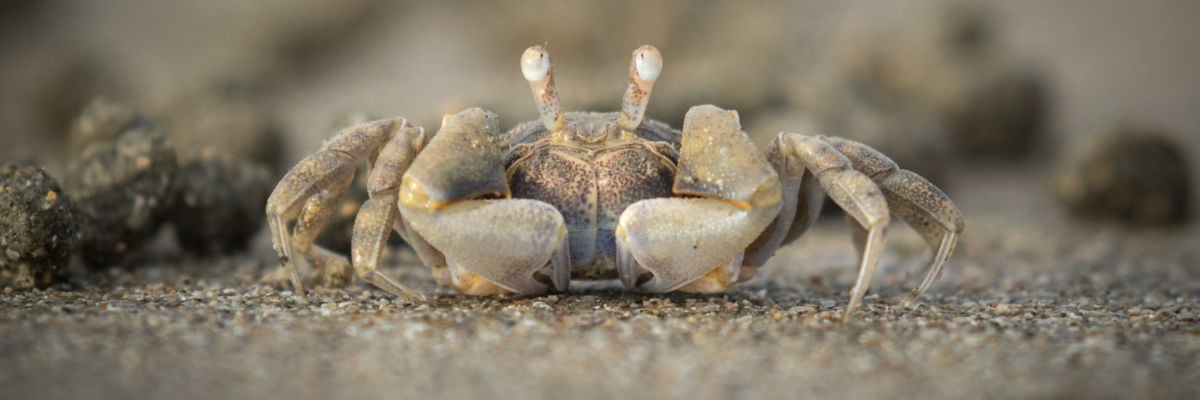
Think humans are different from animals? Or, to be very controversial, dare we say more advanced than animals?
Nonsense! says one biology professor on Twitter. Look at this crab!
(we are not: no species is more ‘advanced’ than any other. each species is uniquely adapted to its environment. This crab could judge any other species for their inability to build sand houses etc. as being ‘less advanced.’ It’s all a matter of perspective)
— Open Ocean Exploration (@RebeccaRHelm) May 16, 2021
People criticizing the notion that humans maintain any lofty status in the Great Chain of Being, or that there even is a Great Chain of Being at all, is nothing new. In H.L. Mencken’s Chrestomathy, he snaps back with the following observation:
Man is botched and ridiculous. Few other brutes are so stupid or so cowardly. The commonest yellow dog has far sharper senses and is infinitely more courageous. The ants and the bees are, in many ways, far more intelligent and ingenious; they manage their government with vastly less quarreling, wastefulness, and imbecility. The lion is more beautiful, more dignified, more majestic. The antelope is swifter and more graceful. The ordinary house-cat is cleaner. The horse, foamed by labor, has a better smell.
And, apparently, crabs build better sand domes.
It would be foolish to argue against Mencken’s points—and if we do it on Twitter, we risk proving his point about man not being particularly dignified. But we could still insist—and rightfully, it seems to me—that the general critique actually supports the Great Chain of Being, along with mankind’s seat at the top of it (or at least near the top of it, but we’re not going to get into the topic of angels here).
To begin, Mencken (and others) conveniently overlooks things man can do that sand bubbler crabs and common yellow dogs cannot. For example:
- Compile a chrestomathy
- Split the atom
- Reason via modus ponens
- Boil crab
Perhaps it is enough to point out that however admirably adapted other animals may be to their environments, crabs are still landing in our traps, whereas man has landed rocket ships on the moon and composed symphonies? (On the other hand, we also invented Twitter.) Man has a power the lower beasts (even the highest among them) do not possess, and that is the power of reason—more specifically, the power to form not just perceptual, but conceptual ideas, which makes us different not only in degree, but in kind.
Take primates, arguably the “highest” animals below man. Can they reason? Robert Spitzer summarizes a test, devised by famed linguist Noam Chomsky, to figure that out:
A simple test . . . would be to grasp the meaning of subject and object in the word order of a sentence—for example “dog bites man” versus “man bites dog.” Even though one could grasp “dog,” “bites,” and “man” through perceptual ideas, one cannot grasp the difference between subject and object in a sentence’s word order without some conceptual (relational) ideas. Do higher primates grasp the syntactical difference between subject and object as small children do who laugh at the curious thought of a man biting a dog? Contemporary research indicates that they do not.
In other words, monkeys do, in fact, display cleverness under experimental situations and are responsive to training (including learning limited aspects of sign language), but let’s be honest: there are hard limits they cannot overcome, given the kind of being they are. It takes a failure to distinguish between perceptual and conceptual ideas to think other animals are rational in the proper sense—able to form conceptual content, reason via the canons of logic, perform Wick rotations, etc. They may be intelligent, loosely speaking, but that’s not the same as being rational.
And it is precisely because of this power of reason that philosophers have long considered human beings special—more advanced, metaphysically speaking—in the hierarchy of being. It’s not because we can outperform other animals at their respective specialized abilities, but because we possess a power distinct from anything else seen in the animal kingdom, which has (for better or worse) enabled us to be the dominant species.
So what’s the problem? Is it speciesist to propose a hierarchy of being? Is there discord between this traditional metaphysical understanding of the world and what evolutionary science tells us? In fact, there is not.
The Great Chain of Being, as defended by modern philosophers such as David Oderberg, is committed, essentially, to three principles:
- Plentitude: An enormous range of conceivable beings is exemplified.
- Continuity: There ought to be no large, noticeable gaps between metaphysical species (that is, we should not see a hop right from purely material bodies—say, rocks—to angelic intellects)
- Gradation: Things are ranked according to their degree of perfection, or the essential powers they have.
These principles don’t conflict with modern evolutionary science (broadly considered); in fact, they fit harmoniously within it. Indeed, there is a vast number of exemplified beings in our world. Evolutionary theory posits a tremendous number of intermediaries, and—though more controversially—there seem to be beings that are higher or lower, or in other words, beings that can be naturally ranked according to their essential powers.
Importantly, the principle of gradation, which is critical to the hierarchy of being, is, as Oderberg explains, meant to be highly generic. So it’s compatible with specific, non-hierarchical arrangements found in biological science. Generally, beings higher on the chain have the powers that the lower beings have plus more. For example, mice have the powers that plants have, like nutrient assimilation and the ability to grow, but they also have more, like locomotion. Likewise, humans have the generic powers that the lower animals have (because we are animals, after all, hence we also have the ability to move, reproduce, feel pain, etc.), though the mode and performance of those powers vary. But we also have an essential power that animals and plants (and rocks) do not: reason.
Keep in mind that the hierarchy has to do with absolute and not relative superiority. Clearly, many animals have relative superiority to one another and even to humans in the powers we share as animals: locomotion, physical combat, building little sand houses, etc. But we, as humans, have absolute superiority when it comes to reason, which animals altogether lack.
Here is another point Oderberg mentions (quoting Bernard Wuellner) relating to both graduation and continuity: “Every superior nature in its least perfection or operation borders on the highest perfection or operation of the nature ranking next below it on the scale of being.” Is this not precisely what we see? The highest of non-rational animals do seem to bump right up against human beings in certain intelligent (or at least pseudo-intelligent) respects, although there does remain a clear distinction. Think of the primitive pseudo-sign language chimpanzees can engage in versus humans’ complex linguistic expression. Or imagine plants that have more complex movement than others, like the Venus flytrap, which borders on, but is still clearly distinct from, the locomotive abilities animals possess.
As for Mencken’s general human buffoonishness, it’s no great mystery. Things with higher powers, when they go wrong, typically wreak more destruction than those with lesser powers. When properly applied, reason allows us to soar higher and faster than any hawk, particularly in fighter planes. When poorly applied, it causes us to be the catastrophe and embarrassment of the cosmos, like when we bomb innocent civilizations. You see this in human professions, too. A good priest makes all the difference in people’s lives, and so does a bad one—more so than a good or bad plumber. For the best priest can effect more overall good than the best plumber; however, the worst priest can also effect more overall damage.
The alleged conflict between modern science and traditional metaphysics is illusory—based on confusions of categories and a failure to make proper distinctions. While the sand bubbler crab gives glory to God and especially God’s design, its ingenuity in constructing domes in the sand in no way detracts from or competes with human beings and their unique hierarchical station in God’s cosmos.
So don’t worry: you won’t offend the crab, even if you might offend his misguided defenders, by saying humans are the most advanced species.



